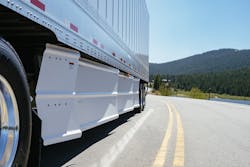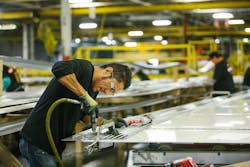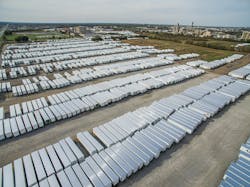Since most trailers last longer than tractors, they always trail in having the latest spec’ing because they’re not replaced as frequently. However, that’s not to say that trailer spec’ing isn’t happening. It certainly is, but fleets value their trailers and appreciate them differently.
For example, many of Utility Trailer’s customers have increased the duty cycle of their drop and hook operations with a shorter length of haul.
Dave Giesen, vice president of sales & Marketing for Stoughton Trailers, said that company is emphasizing stronger but lighter trailers in response to customer demand.
“Over my 25 years in the industry, trailers have lost a lot of weight while also becoming much more durable,” Giesen said. “There’s always a push for higher productivity: Let’s do more with less. Spec’ing has evolved. For example, disc brakes. They’re costly, but they’re available. When they come down in price eventually, people will buy them because they last longer.”
But durability has a very different meaning for trailers rather than tractors.
“With tractors, you’ve got to keep a newer age of fleet to keep drivers,” Giesen explained. “And your maintenance costs get out of hand if you wait too long. With trailers, you can pour more money into maintaining a trailer rather than buying a new one. We have some fleets that run our trailers up to 30 years. Other fleets want to trade at seven years. There’s a broad spectrum depending on how you’re going to maintain the equipment and what they have to do.”
And in how fleets want their trailers spec’d.
“Trailers are getting loaded and unloaded more frequently and thus hitting the docks more frequently,” said Craig Bennett, senior vice president of sales & marketing for Utility Trailers in City of Industry, CA. “This phenomenon increases the duty cycle impacts of the inside walls and floors of the trailer as well from loading devices and also the rear door frame.”
In response to this change in its customers’ operations, Utility’s corrosion-preventative Ultra Road panel coating and stainless steel door frames are now standard on dry vans and reefers. The company has also upgraded trailer floors to carry a 20,000-lb. rating, up from 16,000 lbs., with a 24,000-lb.option.
Utility’s 4000-DX TBR Composite heavy-duty dry van includes an optional polyurethane rounded dock bumper and a 50% thicker bottom rail than the one in the standard 4000-DX Composite van. Undercarriage metal parts, reefer upper couplers, trailer joints, and electrical systems are all designed to prevent corrosion, moisture seepage, and/or scratching.
When it comes to flatbeds, Utility’s 4000-AE was introduced less than two years ago in straight frame and drop frame versions. Bennett said that trailer proved stronger than its predecessor, the 4000-A, at the company’s test track despite being 600 lbs. lighter.
Great Dane’s Chris Lee is an engineer not a marketer, but he has a similar take on the less weight/same durability requests.
“Lightweight is always a top project item,” said Lee, vice president of engineering for the Pooler, GA, company. “Weight has come down and durability is as good or better than it was 10 years ago. We offer a very lightweight composite trailer that weighs less than 12,000 lbs. where the standard dry freight trailer used to be about 14,000 lbs.
“Ten years ago, carbon fiber wasn’t even considered for trailers,” he continued. “Now the price is coming down, so it’s being considered. High strength metal is becoming available. Aluminum is normally 30-40 ksi. We’re looking at 70 ksi, and advanced high tensile steel north of 100 ksi is available. In order to reduce weight, you thin down the material, but you have to maintain durability. That’s where the engineering comes in.”
Giesen said that Stoughton’s standard trailer is built to emphasize longevity more than the cost to customers.
“That’s how we think about it when we put it together. We’ve engineered weight out so we get the same life out of that trailer. There are components that allow you to maintain the strength and take weight out,” Giesen said. “One example would be using a composite floor board that’s got oak on top and a fiberglass reinforced epoxy underlayment. That way you can save weight without the floor tearing up over a five-, six-year period. But it costs more.”
According to Mark Ehrlich, national director of Van Products for Wabash National, Lafayette, IN, the company considers four main factors when it builds its trailers: safety; weight reduction; longevity, which is typically corrosion resistance; and total cost of ownership, which includes asking if this change makes the driver’s life and the maintenance director’s life easier.
“A trailer is a myriad of different materials—plastic, wood, aluminum, steel and rubber—[that interact] when under galvanic corrosion,” said Ehrlich, whose company sells 10 times as many dry vans as reefers. “One of the areas that we pay very close attention to is the main floor connection where the steel cross-member meets the aluminum base rail.
“That’s exposed to all the road salt, debris and water. There’s a very high probability of galvanic corrosion in that connection, but a steel bolt in that connection is going to last the life of the trailer,” he explained. “I can’t say that for an aluminum rivet. Your payload is resting on that connection so that’s very critical. The best damage resistance design is one that never gets damaged. We’ve been very successful in eliminating problems rather than putting a band-aid over them.”
Reducing maintenance time and costs is another critical component of trailer purchases for fleets so the manufacturers have responded.
“Corrosion is a big issue so we offer galvanizing for those that want it,” Giesen said. “Probably a third of our customers want galvanizing. Our base offering is a painted steel component. We do have a very good epoxy undercoat, but it’s still paint. That will get rusty over time; galvanizing doesn’t. Cost is one thing, but there’s also perception. If they want the trailer to look more consistent over a 10-15 year period, then galvanizing will do that. It will become a dull gray, but it won’t rust. It’s a corrosion issue, not a durability issue.”
The relatively cheap move to LED lights by the majority of fleets over the last decade has been prompted by the promise of less maintenance time and fewer roadside inspection violations.
Stoughton has also switched to wheel ends that have a longer warranty—six or seven years depending on the specific components. And the company has dropped its standard 80-90 weight regular oil in favor of a synthetic lube, unless otherwise requested.
Ehrlich said that truck manufacturers and buyers need to learn from their automotive counterparts.
“When you look at the underside of a car today, there’s no metal,” he said. “It’s all non-corrosive material. Our industry [is] behind on some of these things, and we need to catch up. Building big and heavy lasts forever, but we don’t want our customers hauling that. We want them hauling their freight.”
Great Dane has developed its ThermoGuard wall liner with metal foil imbedded in the resin composite base material to prevent outgassing of the insulation blowing agent in the foam for the 30% of its trailers which are reefers.
“When the gas leaks out over time, it permeates through the thermoplastic material but not through metal,” Lee explained. “ThermoGuard has an upcharge, but a lot of the customers find it useful because it provides higher thermal capacity and efficiency over time.
“We can offer a composite floor and lighter weight composite panels for the body of the trailer,” he continued. “We can offer oil or synthetic grease. We don’t make wheel end components, but we work with our supplier to have a better warranty. We offer seven years, which has improved significantly.”
Despite all these offered improvements, Lee said that the choice ultimately rests with the customer.
“Spec’ing a trailer obviously depends heavily on a customer’s operations and their needs,” Lee said. “We can meet any customer’s specs. A lot of the time, they know what they want, and we’ll do our best to suggest the right material.
“We just don’t say, ‘This is a brand-new material. It’s the best in the world. Use it.’ It may not suit their operations,” he continued. “And you don’t want to blast something new on thousands of trailers. You want to start with a small order—see how that works out and then extend it out.”
Or as Ehrlich put it, “We realize that ultimately our customers are in the business of hauling freight, not in the business of spec’ing. So we always try to put ourselves in their shoes. Let’s make it easy for them to spec equipment by thinking about their function and what the trailer needs to be able to do.”
About the Author
David Elfin
David Elfin has run his own web site and served as a media strategist for a successful Congressional campaign. He was the reporter for a national award-winning multimedia series that followed a class of prospective truck drivers seeking their commercial licenses.
Elfin wrote a daily column for washington.cbslocal.com and worked as an on-air analyst for WUSA-9, the local CBS affiliate. A regular for a decade on WTOP-FM, Washington's top-rated station, Elfin has written seven books and served as President of the Pro Football Writers of America and on the selection committees of the Pro Football Hall of Fame and the D.C. Sports Hall of Fame.


